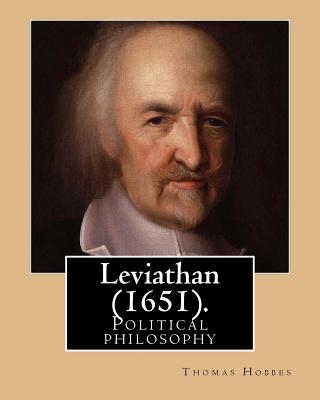Leviathan (1651). By: Thomas Hobbes: Political philosophy

Leviathan (1651). By: Thomas Hobbes: Political philosophy
Leviathan or The Matter, Forme and Power of a Common Wealth Ecclesiasticall and Civil-commonly referred to as Leviathan-is a book written by Thomas Hobbes (1588-1679) and published in 1651 (revised Latin edition 1668). Its name derives from the biblical Leviathan. The work concerns the structure of society and legitimate government, and is regarded as one of the earliest and most influential examples of social contract theory.[5] Leviathan ranks as a classic western work on statecraft comparable to Machiavelli's The Prince. Written during the English Civil War (1642-1651), Leviathan argues for a social contract and rule by an absolute sovereign. Hobbes wrote that civil war and the brute situation of a state of nature ("the war of all against all") could only be avoided by strong, undivided government. Thomas Hobbes (5 April 1588 - 4 December 1679), in some older texts Thomas Hobbes of Malmesbury, was an English philosopher, best known today for his work on political philosophy. His 1651 book Leviathan established social contract theory, the foundation of most later Western political philosophy. Though on rational grounds a champion of absolutism for the sovereign, Hobbes also developed some of the fundamentals of European liberal thought: the right of the individual; the natural equality of all men; the artificial character of the political order (which led to the later distinction between civil society and the state); the view that all legitimate political power must be "representative" and based on the consent of the people; and a liberal interpretation of law which leaves people free to do whatever the law does not explicitly forbid. He was one of the founders of modern political philosophy and political science.His understanding of humans as being matter and motion, obeying the same physical laws as other matter and motion, remains influential; and his account of human nature as self-interested cooperation, and of political communities as being based upon a "social contract" remains one of the major topics of political philosophy. In addition to political philosophy, Hobbes also contributed to a diverse array of other fields, including history, geometry, the physics of gases, theology, ethics, and general philosophy.
PRP: 125.78 Lei
Acesta este Prețul Recomandat de Producător. Prețul de vânzare al produsului este afișat mai jos.
113.20Lei
113.20Lei
125.78 LeiLivrare in 2-4 saptamani
Descrierea produsului
Leviathan or The Matter, Forme and Power of a Common Wealth Ecclesiasticall and Civil-commonly referred to as Leviathan-is a book written by Thomas Hobbes (1588-1679) and published in 1651 (revised Latin edition 1668). Its name derives from the biblical Leviathan. The work concerns the structure of society and legitimate government, and is regarded as one of the earliest and most influential examples of social contract theory.[5] Leviathan ranks as a classic western work on statecraft comparable to Machiavelli's The Prince. Written during the English Civil War (1642-1651), Leviathan argues for a social contract and rule by an absolute sovereign. Hobbes wrote that civil war and the brute situation of a state of nature ("the war of all against all") could only be avoided by strong, undivided government. Thomas Hobbes (5 April 1588 - 4 December 1679), in some older texts Thomas Hobbes of Malmesbury, was an English philosopher, best known today for his work on political philosophy. His 1651 book Leviathan established social contract theory, the foundation of most later Western political philosophy. Though on rational grounds a champion of absolutism for the sovereign, Hobbes also developed some of the fundamentals of European liberal thought: the right of the individual; the natural equality of all men; the artificial character of the political order (which led to the later distinction between civil society and the state); the view that all legitimate political power must be "representative" and based on the consent of the people; and a liberal interpretation of law which leaves people free to do whatever the law does not explicitly forbid. He was one of the founders of modern political philosophy and political science.His understanding of humans as being matter and motion, obeying the same physical laws as other matter and motion, remains influential; and his account of human nature as self-interested cooperation, and of political communities as being based upon a "social contract" remains one of the major topics of political philosophy. In addition to political philosophy, Hobbes also contributed to a diverse array of other fields, including history, geometry, the physics of gases, theology, ethics, and general philosophy.
Detaliile produsului













